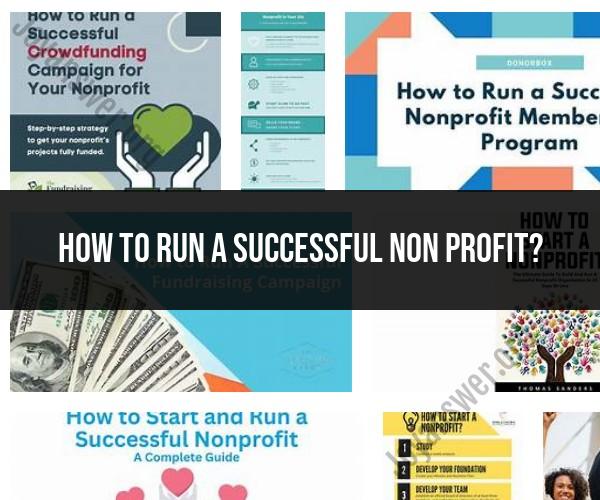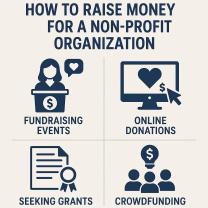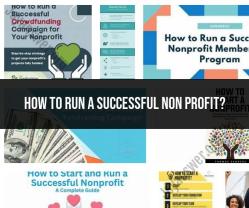How to run a successful non profit?
Running a successful nonprofit organization involves a combination of effective leadership, strategic planning, sound financial management, and a commitment to your mission. Here are key practices and tips to help you run a successful nonprofit:
Clearly Define Your Mission and Vision:
- Your mission statement should be concise, compelling, and easy to understand. Ensure that your organization's mission and vision guide all your activities and decision-making.
Develop a Strategic Plan:
- Create a strategic plan that outlines your organization's goals, objectives, and strategies for achieving them. Regularly review and update the plan to adapt to changing circumstances.
Build a Strong Board of Directors:
- Recruit diverse and committed individuals to serve on your board of directors. Board members should bring various skills, expertise, and connections that can support your nonprofit's mission.
Effective Governance and Leadership:
- Establish clear roles and responsibilities for board members and staff. Ensure that leadership is transparent, accountable, and aligned with the organization's mission and values.
Compliance and Transparency:
- Maintain compliance with all legal and regulatory requirements for nonprofit organizations. Be transparent about your finances, operations, and decision-making processes.
Fundraising and Resource Development:
- Develop a diversified fundraising strategy that includes grants, donations, sponsorships, and earned income. Cultivate relationships with donors and supporters, and continually seek new funding opportunities.
Financial Management:
- Create and maintain a sound financial management system. Regularly monitor budgets, expenses, and revenue to ensure fiscal responsibility.
Program Evaluation and Impact Assessment:
- Measure and evaluate the effectiveness of your programs and services. Collect data and feedback to demonstrate the impact of your nonprofit's work.
Community Engagement:
- Engage with your community and target audience to understand their needs and preferences. Build strong relationships with stakeholders, including volunteers, beneficiaries, and partners.
Volunteer Engagement:
- Recruit, train, and retain volunteers who are passionate about your mission. Make sure they have a meaningful and rewarding experience working with your organization.
Effective Communication:
- Develop a comprehensive communication strategy to raise awareness about your nonprofit's work. Use various channels, including social media, email marketing, and traditional media, to reach your target audience.
Adaptability and Innovation:
- Be open to change and innovation. Adapt your strategies and programs to respond to emerging needs and trends in your field.
Collaboration and Partnerships:
- Collaborate with other nonprofit organizations, government agencies, businesses, and community groups to leverage resources and expertise. Partnerships can enhance your impact and reach.
Grant Writing and Grant Management:
- Develop strong grant writing and management skills to secure funding from foundations, government agencies, and other grant-making entities.
Sustainability Planning:
- Plan for the long-term sustainability of your organization. Explore options for generating earned income, creating endowments, or establishing planned giving programs.
Stay Informed:
- Keep up-to-date with developments in your field and the nonprofit sector. Attend conferences, workshops, and training sessions to enhance your knowledge and skills.
Crisis Management and Risk Mitigation:
- Develop contingency plans and risk mitigation strategies to address potential crises and challenges that may arise.
Celebrate Achievements:
- Recognize and celebrate milestones and successes. Acknowledging achievements can boost morale and motivate your team and supporters.
Running a successful nonprofit organization requires dedication, adaptability, and a commitment to making a positive impact on your community or the world. Continuously assess your organization's performance, seek feedback, and be willing to adjust your strategies to achieve your mission effectively.
Running a Successful Nonprofit: Key Principles and Practices
Running a successful nonprofit organization requires a commitment to mission, strong leadership, effective management, and engaged stakeholders. Here are some key principles and practices to keep in mind:
- Have a clear mission and vision. What is your organization's purpose? What are you trying to achieve? Having a clear mission and vision will help you stay focused and make informed decisions.
- Build a strong team of staff and volunteers. Your staff and volunteers are your most important assets. Invest in their development and create a positive work environment.
- Develop and implement effective programs and services. Your programs and services are the core of your organization's work. Make sure they are well-designed and effective in meeting the needs of your target population.
- Manage your finances responsibly. Nonprofits must be good stewards of their resources. Develop a realistic budget and track your spending carefully.
- Evaluate your impact and make necessary adjustments. It is important to regularly evaluate your organization's impact and make adjustments as needed. This will help you ensure that you are using your resources effectively and meeting your goals.
- Communicate effectively with your stakeholders. Keep your stakeholders informed of your organization's work and progress. This includes staff, volunteers, donors, funders, and the community at large.
The Road to Nonprofit Success: Best Practices for Leaders
Nonprofit leaders play a critical role in the success of their organizations. Here are some best practices for nonprofit leaders:
- Be passionate about your mission. It is important to be passionate about the mission of your organization. This will help you stay motivated and inspire others.
- Be a visionary leader. Nonprofits need leaders who can think strategically and plan for the future. Be able to see the big picture and identify opportunities to grow and impact.
- Be a good communicator. Nonprofit leaders need to be able to communicate effectively with a variety of audiences, including staff, volunteers, donors, funders, and the community.
- Be a team player. Nonprofit leaders need to be able to build and manage a strong team. Be able to delegate tasks, provide support, and foster collaboration.
- Be adaptable. The nonprofit sector is constantly changing. Nonprofit leaders need to be able to adapt to change and be willing to take risks.
Achieving Excellence in Nonprofit Operations: Strategies for Success
To achieve excellence in nonprofit operations, organizations need to focus on efficiency, effectiveness, and continuous improvement. Here are some strategies for success:
- Develop a strategic plan. A strategic plan will help you define your goals and develop a roadmap for achieving them.
- Implement efficient systems and procedures. Having efficient systems and procedures in place will help you save time and money.
- Use technology to your advantage. Technology can help you streamline operations, improve communication, and reach a wider audience.
- Measure and evaluate your performance. It is important to regularly measure and evaluate your performance so that you can identify areas for improvement.
- Invest in staff development. Your staff is your most important asset. Invest in their development so that they can be the best they can be.
By following these key principles and practices, nonprofit organizations can increase their chances of success.









